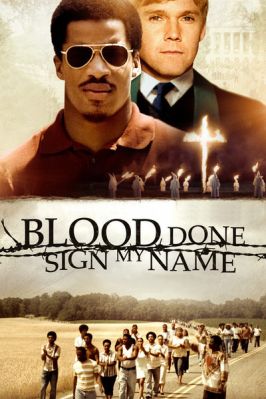Blood Done Sign My Name (2010)
Blood Done Sign My Name is American Drama movie who based on the autobiographical book Blood Done Sign My Name (2004) by historian Timothy Tyson. Written, Directed by Jeb Stuart and also Produced by Jeb Stuart, Mel Efros, David Martin and Mari Stuart who tells of a Black Vietnam veteran is said to have been murdered by a local white businessman, who is later exonerated. The plot focuses on the role of a teacher from the local high school and the civil unrest that followed the acquittal. It starring
- Ricky Schroder as Vernon Tyson
- Omar Benson Miller as Herman Cozart
- Michael Rooker Defense attorney Billy Watkins
- Nate Parker as Ben Chavis
Contents
Plot
Pastor Vernon Tyson is scheduled to arrive in Oxford, North Carolina in 1970 to represent the all-white Methodist church in the area. Although the Civil Rights Movement has a history of more than ten years and it has brought many changes to the lives of people in other places, it bypassed this culture in which Oxford leaders have not replaced blacks with whites. When the minister welcomed a black pastor as a guest missionary, he felt the local beard and the enthusiasm of the congregation. His ten-year-old son Tim (Gattlin Griffith) was shocked by the disgust of blacks by his peers. One night, his father introduced him to a meeting of Ku Klux Klan to introduce the power of hatred.
Ben Chavis, a young and energetic teacher at the all-black Oxford Academy, wants his students to stand up for themselves and speak out against racism. Then the tragedy turns it around for the blacks in Oxford: Ben's nephew, Henry "Dickie" Marrow (A.C. Sanford), who has just returned from a tour of duty in Vietnam, is assassinated by the racist father Robert Teel (Nick Searcy) and his two sons. There are many black witnesses to this heinous crime. The Teels have not been arrested for two days.
The black community's outrage over Marrow's murder is being channeled into a peaceful 50-mile march to the state capitol, led by Gordon Frinks (Afemo Omilami), a national figure in the civil rights movement. Back in Oxford, the rage of young blacks hits a high point when they hear that the entire jury for the Teels trial is white. They set fire to the town's tobacco warehouses using Molotov cocktails. Frinks leaves and Chavis takes over as the chief of his own people. It empowers them to come up with a new strategy: boycotting Oxford companies that have regarded them as second-class citizens for so long. Rev. Tyson also leaves after he is forced to step down, however his crusade to teach Christians the importance of justice finds a zealous and faithful convert in his son Tim.
Controversy
This movie shows that black people cant be the same as white people ever, There are scene all children still attend separate schools; blacks must buy their movie tickets and enter by a side door and sit in the balcony, their money is welcome in the stores, but they can work in them only if they push a broom and there is a scene when white barber will not cut a black’s hair, and a white grocery store owner sells goods at jacked-up prices, telling one upset woman that she can walk the distance to a store in another town if she wants the item at the cheaper price. And id there any black man who added as a police officers, everyone knows that he is not permitted to ticket or arrest a white man. And the most saddest part is when you were witness to a murder of a black man by a white man and youre scared because you are black and you know you cant do anything.[1]
Pros
The film shows that when people agreed to march in the Capitol, fifty miles away, they protested to the governor about the unfair treatment of blacks, and they were given justice for the brutal killing of a completely innocent black by three whites. There are even some witnesses. There are also speeches by actors from blacks to blacks for justice. "We will not stop until we have justice. No! Blood has done signed our name! The blood of Martin Luther King…the blood of Medgar Evers…the blood of Malcolm X…the blood of Dickie Marrows brought us here today.” [2]
People born in 1970 will be 40 years old this year. The declaration of white racists by an all-white jury is no longer a common practice in the South. Many people have taken unpopular and bold actions to achieve this change, but this change is not yet complete. But this happened. I think Tim Tyson, who is less than 50 years old, wrote a book saying it happened. If you know how to look at it, history will not happen too quickly to be seen.[3]

